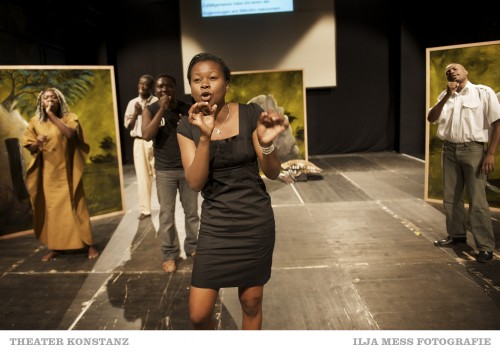Having eighteen performances after its premier at the Spiegelhalle in Konstanz, Germany and having witnessed a great reception by the city of Konstanz, the play is set to be performed in Malawi for the next coming weeks. The first group which comprises four actors (Misheck Mzumara, Jeremiah Mwaungulu, Noah Bulambo and Dipo Katimba) and the two directors (Clemens Bechtel and Thokozani Kapiri) left for malawi on Sunday, the 8th of July and the rest (Susi Wirth, Michael Müller, Thomas Ecke and Julia) took their flight to Malawi on Wednesday, July 11.
The play is expected to be performed in Malawi on the 15th of July this year at Nanzikambe Arts theatre space in Blantyre. From there the play will be showcased in the country’s lakeside, in Mangochi district at the district hall on the 18th of July. The northern region will have their time to watch The Aid Machinery performance in Mzuzu on July 21 at Mzuzu university hall. The last performance in Malawi will take place on July 24 at Madsoc Theatre in Lilongwe, the capital city
After safely arriving in Malawi the last group of actors which comprises the Germany crew, had their first taste of Africa barely two hours of their being there. They apparently had a car breakdown as they were on their way to Blantyre from Lilongwe. What a way to get introduced to the African environment. So the crew got stranded along the way and had to search for a mere public transport to take them to their destination. Well, what else can be said? All the best to World 3.0:The Aid Machinery.
(O’tooli Masanza)
‘’We stay when the others leave’’, is a line quoted from one of the lady Africans working in a German NGO Office, in the play World 3.0: The Aid Machinery. In the scene, the young lady explains or rather complains how she does the same kind of work that her European colleague does, but gets half the European salary.
But The Aid Machinery is not a play about how people of different races work and get paid in different offices and organizations. It is a play about the conflicts that arise between African and European communities on the basis of Development Aid. It focuses more on how funds get misused and how a lot of people get negatively affected by it.
In the play, an African village is given money to help construct a powerhouse which will help generate electricity for the whole village. It is the coming of this money that cause a lot of conflicts because of the people that the NGO must first please with the money, in order to freely work on the project, which in the end does not help constructing the powerhouse.
The Aid Machinery, a nine cast play, directed by Clemens Bechtel and Thokozani Kapiri had its premier on the 8th of June, after having eight weeks of rehearsal. It is a play that brought together different funders of both Theatre and Development Aid to come and witness the reality of Development Aid.
(O’tooli Masanza)

Einer der bekanntesten Mythen Malawis, der implizit Hexerei und Gifturteile anprangert und nichts von seiner Stärke verloren hat, wird von Misheck Mzumara und Aaron Ngalonde aus neuem, doch historisch universellem Kontext erzählt. In ihre Arbeit, basierend auf einem der wichtigsten malawischen Dramen “The Rainmaker” von Steve Chimombo, fließen dabei auch jüdische und britische Geschichten ein.
The Messenger („Der Bote“) handelt von der malawischen Legende um M’bona, dem Boten. M’bona, illegitimer Neffe des Häuptlings Lundu, von seiner Mutter empfangen ohne Zutun eines Mannes, tötet bei seinem ersten Ritual als Regenmacher Lundus Sohn. Lundu sendet seine Krieger um M‘bona zu töten, sie scheitern jedoch an der unmöglichen Aufgabe, bis M‘bona entschließt sich zu opfern, um die leidvolle Jagd der Männer zu beenden. Das Blut M’bonas formt nach dessen Tod einen Fluss, sein Kopf wird in Nsanje begraben, einer Stadt im Süden Malawis. Der Regenkult um M’bona besteht hier noch heute.
Die Premiere war gestern, 16.06.2011, weitere Vorstellungen 17.-20.06. in der Spiegelhalle des Theater Konstanz. Eine erste Kritik ist auf nachtkritik zu finden.

Der Kampf mit Vorurteilen
“Nkhata Bay – Inventing Parzival” feiert am Freitag Premiere im Landesmuseum. Regisseur Clemens Bechtel und Dramaturg Thomas Spieckermann sprechen über das malawische Theaterprojekt.
Hier zum Artikel im Südkurier
Ein Ergebnis der Kooperation mit Studenten des Moduls »Editorial Design« bei Prof. Karin Kaiser der HTWG Konstanz ist das neue Logo für »Crossing Borders – von See zu See«






 Pfadfinder
Pfadfinder Spotlight
Spotlight

